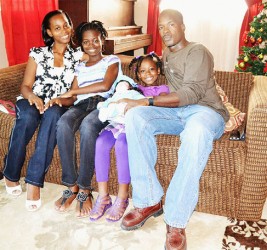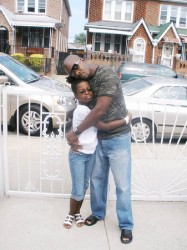In honour of Father’s Day, Sunday Stabroek interviewed Wil Campbell, teacher
and counsellor, on the challenges of being a father and what the
role demands.
For Wil Campbell being a father simply means striving every day to be the kind of man he would want his two daughters to one day choose for a husband.
That means not only ensuring that their physical needs are met but more importantly spending quality time with them, ensuring they are not only involved in academic pursuits but also extra-curricular activities, teaching them about the love of God and loving and respecting their mother – his wife.
“I am trying to be the kind of man that I would want my sons-in-law to be…” Campbell said during a recent interview with this newspaper.
He only started on the journey of fatherhood 13 years ago, but it is one of the most fulfilling journeys in his life and he has not regretted it even though every day is a learning process.
A trained teacher and counsellor by profession Campbell has been working with children for all his adult life, and he believed that he was prepared for fatherhood when his eldest daughter was born but quickly realized that it was an ‘on the job’ learning experience.
“I would like to think that I was born a father,” was how he responded when the Sunday Stabroek asked him about fatherhood, but it was not long before he admitted that even though it has been fulfilling it has not been an easy journey.
As he put it, when “reality kicked in” he realised that one is never really ready for that most important role in life and even though as a trained counsellor he does a lot in the area of parental counselling, he still sometimes “feel out of my depth as a father.”

“To be honest it is a learning process and you learn as you go,” he said.
He noted that when taking on the role of parenthood a person’s life changes significantly, and one of the changes he experienced was that he became more cautious about the way he lived his life and the risks he took.
“There are many things that I did before that I wouldn’t want my children to see me doing, and so I stopped doing those things. In terms of activities I was a risk taker and I liked bikes, but those things I don’t do any more because I have at least two people to live for,” he said.
Thirteen years after setting eyes on his first child Campbell still cannot describe the feeling he experienced at that moment but eventually he said it was a “beautiful, awe-inspiring scary experience.”
“When I saw that little bundle I was at a loss for words, sort of as I am now, but it was a really beautiful experience knowing that I participated in the creation of this new life. It was scary in the sense that now I am responsible for the wellbeing of another human being… and I wasn’t sure any more that I was prepared.”
And fatherhood also changed the manner in which Campbell loves his wife as he revealed that he now has two more reasons (his children) to love his wife as she blessed him with his daughters.
“I have a lot more respect and compassion for my wife and women in general now that I have had the experience of walking with her during the journey of pregnancy and child bearing and child rearing,” he said.
And he concedes that while he is an “involved father” there is no way he could do as much as his wife does for his two daughters.
What makes a good father?

“A good father is one who is committed to raising his children,” Campbell said when asked about what was required, and he went on to say that there may be a long list of qualities and attributes that could be added but the bottom line is it is someone who makes sacrifices and is there for his children.
While this did not apply in his case, Campbell stated that one of the main challenges in fatherhood is the lack of proper role models as not many young men have a good father to pattern their life after.
“I am fortunate in that regard… my father was a solid role model; even today he is very supportive of what I do and I have to stop him sometimes and say ‘you know your job is done just sit back and watch your results,’” Campbell said about the man who has most influenced his life.
He is also humbled by the fact that his father would tell him continuously that he is learning from him how to be a good father.
Campbell pointed out that parenting is this era is difficult as humans have become very materialistic and spend a lot of time acquiring and achieving, making it difficult to spend quality time with children. Another difficulty is the numerous attractions competing for children’s attention, and a lot of times they do not listen to their parents who often are out making a dollar.
One of his personal challenges comes from working with children and youths all his life which gives him an up-close and personal look at what they are involved in, that at times causes him to be “possessed by a terrible fear that my children will suffer some of the same experiences and it is difficult not to allow your parenting method to be motivated out of that fear.”
At times he has to stop himself from acting towards his children as if they are already guilty of some of the activities he sees young people involved in.
For Campbell is it very important to ensure that his daughters are not only studious but engage in other activities that would help them to become well rounded social beings. They are members of the Pathfinder Club, which is a youth club of the Seventh Day Adventists, and they are both into music and enjoy it. He is also mindful of his children stuck in front of a screen playing games all the time.
“For me it is very important for them to get out in the yard and run around, and even though they are girls I have no difficulty with them climbing trees and exploring and doing boy’s stuff like cricket and football.”
Trained as providers
For Campbell he understands the difficulty some men may have in understanding their roles as fathers, because society trains them to be the providers for their families. He noted that if a woman decides not to work and be a homemaker instead, no one says she is lazy, but a man more often than not does not have that option.
“The demands are on him that he must put bread on the table, and a lot of men don’t really understand their role; they believe that is all that is required of them, and for many of us fathers – and even I myself find myself guilty – we are providing, and at the end of the day we come home and put our feet up.”
Many times even the men who live with their children ‘drop the money off’ and are uninvolved in their lives. For him poor parenting is also responsible for men having children with multiple women as many of them would have grown up seeing this.
In this regard Campbell said that women are also out toiling for bread, but they are left to nurture the children and ensure that their other needs are met. He feels that women have some “reserve energies” because even though he and his wife work equally long hours, when they get home it is difficult for him to do anything else but lie down while, “as soon as she hits the door she takes off her shoes and she is helping with homework, she is preparing dinner, preparing for tomorrow and I don’t have one ounce of energy left.”
“I take my hat off [to women],” he said.
Another causal factor for men becoming poor fathers, according to Campbell, is the low standard that some women set. Qualifying this, Campbell stated that if a woman is with a man she would not want her son to be then she should not have sex with him. They keep making a series of “mistakes” and they would then get a number of “baby daddies.”
He also pointed out that some mothers boast about how many women their sons are involved with and this reinforces the behaviour. He said he worries about what the future generation is going to look like when he sees the degeneration of moral standards and the decline in the quality of parenting. In addition there is the unwillingness or inability of a lot of parents to actually take up their responsibilities and set standards for their children and see that they meet them.
“I am really concerned about what the next generation is going to look like.”
Asked if he was scared for his daughters, Campbell quickly responded “no.”
“I believe that I am setting a good example. A lot of us don’t understand that fathers are also good role models for their daughters, and daughters look to what their fathers do and they almost automatically choose the kind of man their father is or was,” Campbell said.
Campbell lived out of Guyana for a number of years and would have continued his teaching career there but he recently returned to Guyana because he just wanted to ensure that his country benefited from his skills.
“I am back because I got tired of giving all my skills, energy and the little bit of expertise that God blessed me with to another man’s country… and that is the primary reason why I am back,” he said, adding that his children, who were born outside Guyana, love living here.
Apart from being a counsellor and a motivational speaker Campbell is the Headmaster of Josel’s Educational Institute, and he also lectures in psychology at the University of the Southern Caribbean.
While today is Father’s Day Campbell was expecting it to be very quiet, and thought that it would begin with him waking up late in bed and “two little girls serving me breakfast in bed.” “These ladies surprise me every year,” he said.
For him every day is Father’s Day and Mother’s Day.
It would be just special spending time with his daughters Chade and Cherie and wife Donna.





